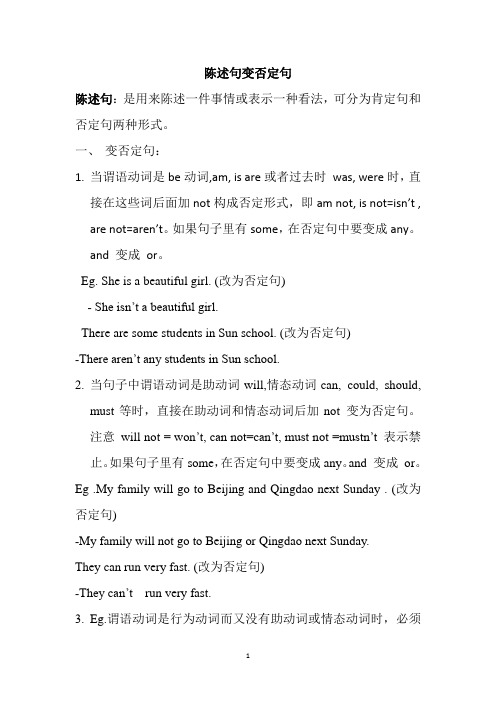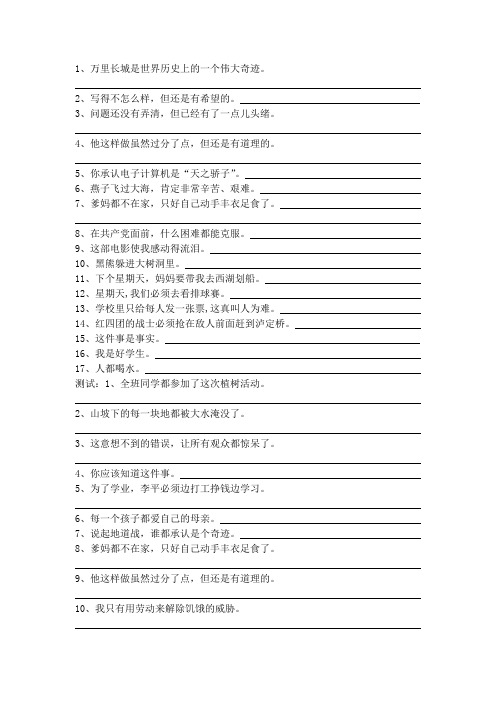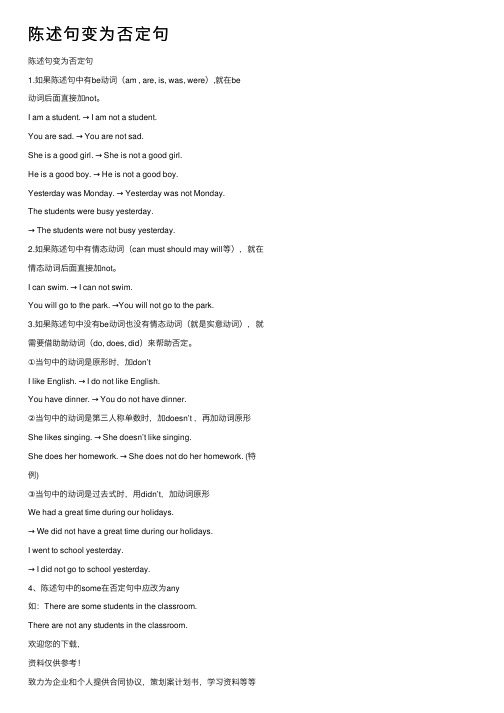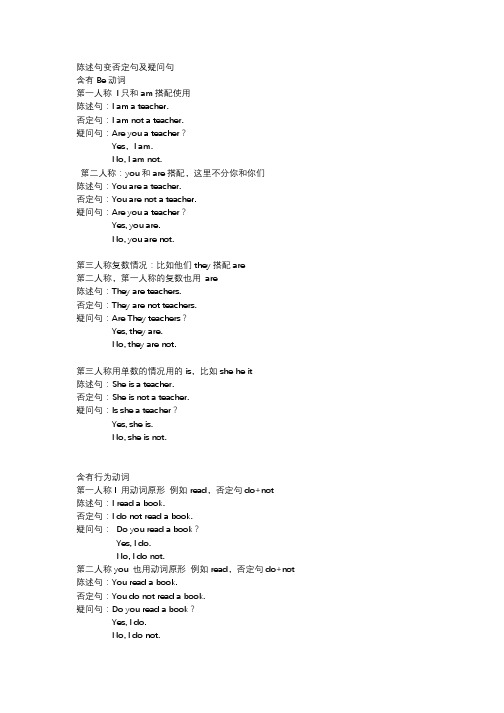陈述句变否定句
小升初专项:陈述句变否定句

陈述句变否定句陈述句:是用来陈述一件事情或表示一种看法,可分为肯定句和否定句两种形式。
一、变否定句:1.当谓语动词是be动词,am, is are或者过去时was, were时,直接在这些词后面加not构成否定形式,即am not, is not=isn’t , are not=aren’t。
如果句子里有some,在否定句中要变成any。
and 变成or。
Eg. She is a beautiful girl. (改为否定句)- She isn’t a beautiful girl.There are some students in Sun school. (改为否定句)-There aren’t any students in Sun school.2.当句子中谓语动词是助动词will,情态动词can, could, should,must等时,直接在助动词和情态动词后加not 变为否定句。
注意will not = won’t, can not=can’t, must not =mustn’t 表示禁止。
如果句子里有some,在否定句中要变成any。
and 变成or。
Eg .My family will go to Beijing and Qingdao next Sunday . (改为否定句)-My family will not go to Beijing or Qingdao next Sunday.They can run very fast. (改为否定句)-They can’t run very fast.3.Eg.谓语动词是行为动词而又没有助动词或情态动词时,必须在谓语动词前加助动词,一般现在时加助动词do ,第三人称单数加does,一般过去时加did,再和not构成否定结构。
don't, doesn't, didn't后都用动词原形。
如果句子里有some,在否定句中要变成any。
陈述句变疑问句和否定句

1.We always go to school on foot every day. We always don’t go to school on foot every day. 2.They went to the hospital to see their good friend, Tom. They didn’t go to the hospital to see their good friend ,Tom. 3.My good friend has two eggs and a glass of milk in the morning before he goes to school. My good friend doesn’t have two eggs or a glass of milk in the morning before he doesn’t go to school .
1.The twins are watching TV now. The twins are not(aren’t) watching TV now. 2.They were in the front of the classroom. They were not(weren’t) in the front of the classroom. 3.The child can play the piano very well. The child can not(can’t)play the piano very well. 4.We students should help each other in study . We students should not(shouldn’t) help each other in study.
陈述句疑问句否定句的转换

陈述句疑问句否定句的转换陈述句、疑问句和否定句是语法中常见的三种句式。
它们在句子表达和交流中有不同的功能和作用。
本文将介绍如何转换陈述句为疑问句和否定句,并提供一些例子来帮助读者更好地理解。
一、陈述句转换为疑问句将陈述句转换为疑问句,通常有两种方式:改变语序和添加疑问词。
1. 改变语序:将陈述句的语序改为“助动词/情态动词+主语+动词+其他”。
Example 1:陈述句:She dances very well.疑问句:Does she dance very well?Example 2:陈述句:They have finished their work.疑问句:Have they finished their work?2. 添加疑问词:在陈述句中添加疑问词,如“what, who, where, why, how, when”等。
Example 1:陈述句:I visit my grandparents every Sunday.疑问句:When do I visit my grandparents?陈述句:She bought a new car.疑问句:What did she buy?二、陈述句转换为否定句将陈述句转换为否定句,通常有两种方式:在动词前添加否定词或改变主语。
1. 在动词前添加否定词:将陈述句的动词前添加否定词,如“don't/doesn't/didn't”。
Example 1:陈述句:He goes to school by bus.否定句:He doesn't go to school by bus.Example 2:陈述句:She likes swimming.否定句:She doesn't like swimming.2. 改变主语:将陈述句中的主语改为相应的否定形式。
Example 1:陈述句:Jim plays football on weekends.否定句:Jim doesn't play football on weekends.陈述句:Mary has finished her homework.否定句:Mary hasn't finished her homework.三、疑问句转换为陈述句或否定句将疑问句转换为陈述句或否定句,需要根据具体情况进行转换。
陈述句变否定句的规则

陈述句变否定句的规则1. 加上否定词:在陈述句中加上否定词,如"不"、"没有"、"无"、"非"等,来表示否定的意思。
例如:陈述句:他是个好学生。
否定句:他不是个好学生。
2. 改变动词形式:将陈述句中的动词改为否定形式。
例如:陈述句:他喜欢吃苹果。
否定句:他不喜欢吃苹果。
3. 加上反义词:在陈述句中加上表示相反意义的词语。
例如:陈述句:这个房间很干净。
否定句:这个房间不干净。
4. 改变句子结构:改变陈述句的句子结构,使其变为否定句。
例如:陈述句:她是一个聪明的学生。
否定句:没有一个学生聪明如她。
5. 加上条件状语从句:在陈述句中加上条件状语从句,表示不成立的条件。
例如:陈述句:如果他努力学习,他会考上大学。
否定句:如果他不努力学习,他不会考上大学。
6. 加上否定副词:在陈述句中加上否定副词,如"从未"、"决不"、"绝不"等,来表示否定的意思。
例如:陈述句:他总是按时完成任务。
否定句:他从未按时完成任务。
7. 改变句子代词:将陈述句中的代词改为否定形式。
例如:陈述句:我喜欢这本书。
否定句:我不喜欢那本书。
8. 加上否定前缀:在陈述句的形容词、名词前加上否定前缀,表示否定的意思。
例如:陈述句:这个问题很简单。
否定句:这个问题不简单。
9. 改变句子的否定形式:将陈述句改为否定形式,表示相反的意思。
例如:陈述句:他是一个优秀的演员。
否定句:他不是一个优秀的演员。
10. 加上否定连词:在陈述句中加上否定连词,如"但是不"、"然而不"等,表示相反的意思。
例如:陈述句:他虽然帅,但是没有才华。
否定句:他虽然帅,但是没有才华。
11. 加上表示否定的副词:在陈述句中加上表示否定的副词,如"不可能"、"不曾"、"绝不"等,表示否定的意思。
陈述句变双重否定句练习

1、万里长城是世界历史上的一个伟大奇迹。
2、写得不怎么样,但还是有希望的。
3、问题还没有弄清,但已经有了一点儿头绪。
4、他这样做虽然过分了点,但还是有道理的。
5、你承认电子计算机是“天之骄子”。
6、燕子飞过大海,肯定非常辛苦、艰难。
7、爹妈都不在家,只好自己动手丰衣足食了。
8、在共产党面前,什么困难都能克服。
9、这部电影使我感动得流泪。
10、黑熊躲进大树洞里。
11、下个星期天,妈妈要带我去西湖划船。
12、星期天,我们必须去看排球赛。
13、学校里只给每人发一张票,这真叫人为难。
14、红四团的战士必须抢在敌人前面赶到泸定桥。
15、这件事是事实。
16、我是好学生。
17、人都喝水。
测试:1、全班同学都参加了这次植树活动。
2、山坡下的每一块地都被大水淹没了。
3、这意想不到的错误,让所有观众都惊呆了。
4、你应该知道这件事。
5、为了学业,李平必须边打工挣钱边学习。
6、每一个孩子都爱自己的母亲。
7、说起地道战,谁都承认是个奇迹。
8、爹妈都不在家,只好自己动手丰衣足食了。
9、他这样做虽然过分了点,但还是有道理的。
10、我只有用劳动来解除饥饿的威胁。
陈述句变为否定句

陈述句变为否定句陈述句变为否定句1.如果陈述句中有be动词(am , are, is, was, were),就在be动词后⾯直接加not。
I am a student. → I am not a student.You are sad. → You are not sad.She is a good girl. → She is not a good girl.He is a good boy. → He is not a good boy.Yesterday was Monday. → Yesterday was not Monday.The students were busy yesterday.→ The students were not busy yesterday.2.如果陈述句中有情态动词(can must should may will等),就在情态动词后⾯直接加not。
I can swim. → I can not swim.You will go to the park. →You will not go to the park.3.如果陈述句中没有be动词也没有情态动词(就是实意动词),就需要借助助动词(do, does, did)来帮助否定。
①当句中的动词是原形时,加don’tI like English. → I do not like English.You have dinner. → You do not have dinner.②当句中的动词是第三⼈称单数时,加doesn’t ,再加动词原形She likes singing. → She doesn’t like singing.She does her homework. → She does not do her homework. (特例)③当句中的动词是过去式时,⽤didn’t,加动词原形We had a great time during our holidays.→ We did not have a great time during our holidays.I went to school yesterday.→ I did not go to school yesterday.4、陈述句中的some在否定句中应改为any如:There are some students in the classroom.There are not any students in the classroom.欢迎您的下载,资料仅供参考!致⼒为企业和个⼈提供合同协议,策划案计划书,学习资料等等打造全⽹⼀站式需求。
陈述句变否定句一般疑问句 特殊疑问句及练习(全面)

句型转换的方法一、 肯定句改否定句的方法——一步法1、 在be动词后加not。
如:is not , are not , am not, was not, were not;2、 在can,should, will等后加not。
如:cannot, should not,will not;3、 上述都没有的,在动词前加助动词否定形式don’t/doesn’t/didn’t。
4、 some 改成any。
把下面的句子变成否定句。
1. She is watching TV now.2. We go to school on Sunday.3. His father works hard.4. Jack's mother is a nurse.5. The cat runs fast.6. They like reading books.7. My grandpa gives me a hot dog.8. Tom often walks to school.9. I have a doll.10. It is eating fish.二、 肯定句改一般疑问句的方法——三步法1、 把be动词放在句首,剩下的照抄,(some 改成any,my改成your 等)句点改成问号。
2、 把can,shall, will等放到句首,剩下的照抄,(some 改成any,my改成your等)句点改成问号。
例如:陈述句: They are in the park. He can play the guitar..一般疑问句: Are they in the park? Can he play the guitar?把下列句子变成一般疑问句1. I am listening to music.______________________________________2. Mike is a student._______________________________________3. Sarah can clean the classroom.________________________________________4. They are in the zoo.________________________________________5. There are some flowers in the vase.________________________________________6.This is my sister._________________________________________7.We are sweeping the floor.__________________________________________3、 上述都没有的,在句首请助动词Do/Does/Did帮忙,剩下的照抄,(some 改成any,my改成your等)句点改成问号。
陈述句变否定句及疑问句

陈述句变否定句及疑问句含有Be动词第一人称I只和am搭配使用陈述句:I am a teacher.否定句:I am not a teacher.疑问句:Are you a teacher?Yes,I am.No, I am not.第二人称:you和are搭配,这里不分你和你们陈述句:You are a teacher.否定句:You are not a teacher.疑问句:Are you a teacher?Yes, you are.No, you are not.第三人称复数情况:比如他们they搭配are第二人称,第一人称的复数也用are陈述句:They are teachers.否定句:They are not teachers.疑问句:Are They teachers?Yes, they are.No, they are not.第三人称用单数的情况用的is,比如she he it陈述句:She is a teacher.否定句:She is not a teacher.疑问句:Is she a teacher?Yes, she is.No, she is not.含有行为动词第一人称I 用动词原形例如read,否定句do+not陈述句:I read a book.否定句:I do not read a book.疑问句:Do you read a book?Yes, I do.No, I do not.第二人称you 也用动词原形例如read,否定句do+not 陈述句:You read a book.否定句:You do not read a book.疑问句:Do you read a book?Yes, I do.No, I do not.第三人称复数they 也用动词原形read ,否定句直接加not陈述句:They read a book.否定句:They do not read a book.疑问句:Do they read a book?Yes, they do.No, they do not.第三人称单数she 要用动词的复数形式reads。
- 1、下载文档前请自行甄别文档内容的完整性,平台不提供额外的编辑、内容补充、找答案等附加服务。
- 2、"仅部分预览"的文档,不可在线预览部分如存在完整性等问题,可反馈申请退款(可完整预览的文档不适用该条件!)。
- 3、如文档侵犯您的权益,请联系客服反馈,我们会尽快为您处理(人工客服工作时间:9:00-18:30)。
陈述句变否定句一、把下列陈述句改为否定句。
1. We go to school on Sunday.We don’t go to school on Sunday.答案解析:陈述句改为否定句时,如果句中没有be动词,找主语,如果主语不是第三人称单数,时态是一般现在时,在主语后加don’t。
2. We’ll go to the park this afternoon.We won’t go to the park this afternoon.答案解析:陈述句改为否定句时,will的否定形式是won’t。
3. I am watching TV now.I am not watching TV now.答案解析:陈述句改为否定句时,当句中有be动词时,在be动词后not。
4. Jack’father is a teacher.Jack’father isn’t a teacher.答案解析:陈述句改为否定句时,当句中有be动词时,在be动词后not。
5. The dog runs fast.The dog doesn’t run fast.答案解析:陈述句改为否定句时,如果句中没有be动词,找主语,如果主语是第三人称单数,时态是一般现在时,主语后加doesn’t。
6. The baby can speak.The baby can’t speak.答案解析:陈述句改为否定句时,句中有can ,may等时,在主语后直接加not。
7. There is some water in the bottle.There isn’t any water in the bottle.答案解析:陈述句改为否定句时,当句中有be动词时,在be动词后not,some 要改为any。
8. Her mother works hard.Her mother doesn’t work hard.答案解析:陈述句改为否定句时,如果句中没有be动词,找主语,如果主语是第三人称单数,时态是一般现在时,主语后加d oesn’t。
9. They like reading books.They don’t like reading books.答案解析:陈述句改为否定句时,如果句中没有be动词,找主语,如果主语不是第三人称单数,时态是一般现在时,在主语后加don’t。
10. We had lessons this morning.We didn’t have lessons this morning.答案解析:陈述句改为否定句时,如果句中没有be动词,找主语,如果主语不是第三人称单数,时态是一般过去时,在主语后加didn’t。
11. I have a doll.I don’t have a doll.答案解析:陈述句改为否定句时,如果句中没有be动词,找主语,如果主语不是第三人称单数,时态是一般现在时,在主语后加don’t。
12. It is a fish.It isn’t a fish.答案解析:陈述句改为否定句时,当句中有be动词时,在be动词后not。
13. They speak English.They don’t speak English.答案解析:陈述句改为否定句时,如果句中没有be动词,找主语,如果主语不是第三人称单数,时态是一般现在时,在主语后加don’t。
14. She can clean the bedroom.She can’t clean the bedroom.答案解析:陈述句改为否定句时,句中有can ,may等时,在主语后直接加not。
15. I have some money in my pocket.I don’t have any money in my pocket.答案解析:陈述句改为否定句时,如果句中没有be动词,找主语,如果主语不是第三人称单数,时态是一般现在时,在主语后加don’t,some要改成any。
陈述句变否定句的练习题I.Be 动词1.He is a boy._______________________________________________2.I am your friend._______________________________________________3.My sister is a beatiful girl._______________________________________________4.My mother is a worker._______________________________________________5.They are in the classroom._______________________________________________6.There are some books on the bookshelf._______________________________________________7.I was at home yesterday._______________________________________________8.They were in Beijing ten years ago._______________________________________________9.I am looking for a job recently.______________________________________________10. The students are playing basketball in the playground.______________________________________________II.情态动词1.Lucy will be back in a week.______________________________________________2.She can sing a song and draw a picture.______________________________________________3.You can use the dictionary.______________________________________________4.Peter need go home tomorrow.______________________________________________5.You should line up when you wait for a bus.______________________________________________6.We need learn something to cook.______________________________________________7.I can write a book.______________________________________________8.You should say “Sorry” to somebody who you hurt him.______________________________________________9.He must stay at home to finish his homework.______________________________________________10.I can go to Shanghai Zoo.______________________________________________III.实意动词1.We come from China.______________________________________________ 2.We like the mask.______________________________________________ 3.He likes the violin.______________________________________________ 4.Have some bread, Tom.______________________________________________ 5.Please open your books.______________________________________________ 6.I like Chinese、Maths、Art and PE.______________________________________________ 7.She has a shower in the morning.______________________________________________ 8.Peter did lots of work in the company last night.______________________________________________ 9.They had a lot of fun in past ten years.______________________________________________ 10.I used to play the piano.______________________________________________answer:I.Be动词1. He is a boy.He is not a boy.2. I am your friend.I am not your friend.3.My sister is a beatiful girl.My sister is not a beatiful girl.4.My mother is a worker.My mother is not a worker.5.They are in the classroom.They are not in the classroo.6.There are some books on the bookshelf.There are not any books on the bookshelf.7. I was at home yesterday.I was not at home yesterday.8. They were in Beijing ten years ago.They were not in Beijing ten years ago.9.I am looking for a job recently.I am not looking for a job recently.10. The students are playing basketball in the playground.The students are not playing basketball in the playground.II.情态动词11.Lucy will be back in a week.Lucy will not be back in a week.12.She can sing a song and draw a picture.She can not sing a song and draw apicture.13.You can use the dictionary.You can not use the dictionary.14.Peter need go home now.Peter need not go home now15.You should line up when you wait for abus.You should not line up when you waitfor a bus.16.We need learn something to cook.We need not learn anything to cook.17.I can write a book.I can not write a book.18.You should say “Sorry” to somebodywho you hurt him.You should not say “Sorry” to somebodywho you hurt him.19.He must stay at home to finish hishomework.He must not stay at home to finish hishomework.20.I can go to Shanghai Zoo.I can not go to Shanghai Zoo.III.实意动词21. We come from China.We don’t come from China.22.We like the mask.We don’t like the mask.23.He likes the violin.He doesn’t like the violin.24.Have some bread, Tom.Do not have any bread, Tom.25.Please open your books.Please do not open your books26.I like Chinese、Maths、Art and PE.I don’t like Chinese、Maths、Art and PE27.She has a shower in the morning.She doesn’t have a shower in themorning.28.Peter did lots of work in the companylast night.She didn’t do a lot of work in thecompany last night.29.They had a lot of fun in past ten years.They didn’t have a lot of fun in past tenyears.30.I used to play the piano.I didn’t use to play the piano.。
